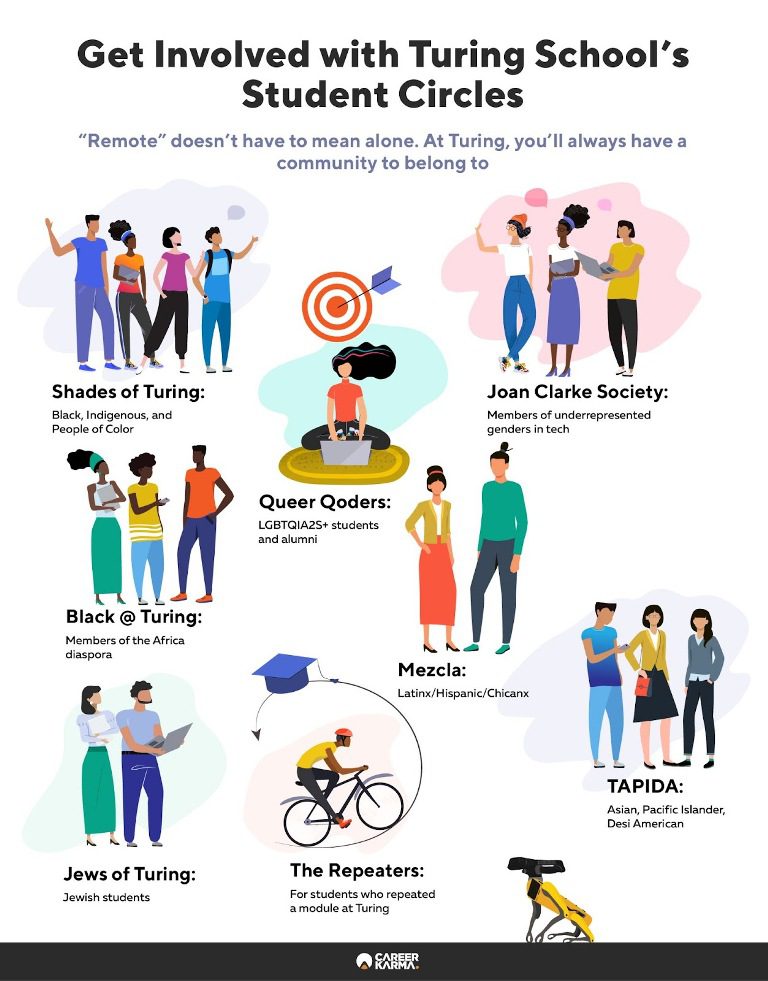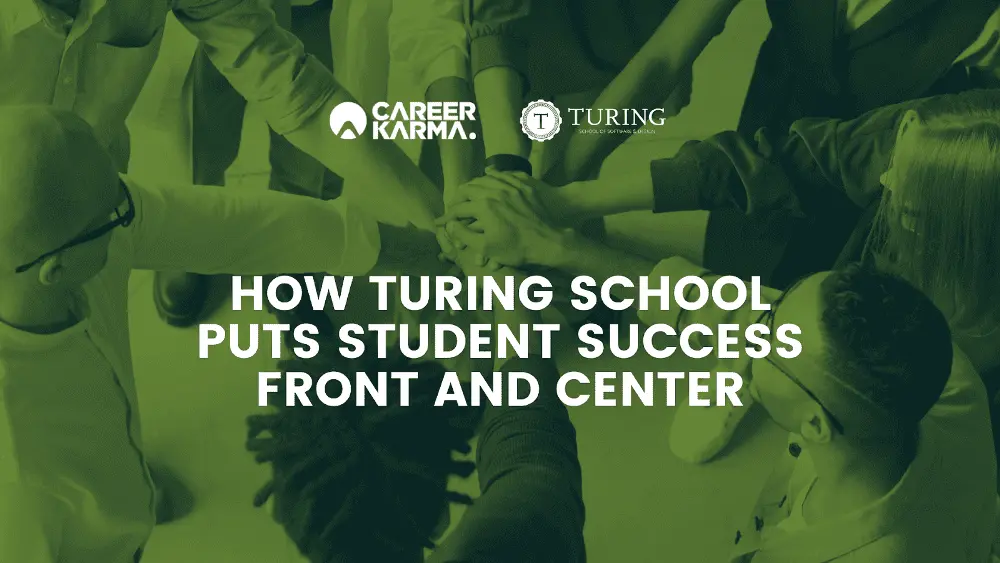Since 2015, Colorado-based coding bootcamp Turing School has always put student needs at the core of its services. Turing School has recently shifted to an all-remote model. This way, its student outreach can be seen and heard by prospective students from across the United States in a more profound, more personal, and more diverse way.
One major goal of Turing School is to prepare students for the job market and eventually help them land their ideal job in tech. A huge propeller for this is Turing School’s career services, which are designed to help students get jobs in software development and last beyond their experiences with the bootcamp.
Students from Turing find themselves often working as software developers, with an average starting salary of $75,000, according to the school’s outcomes report. Some even go on to educate others and teach programming.
So, what’s propelling such success?
As Turing students learn to prepare themselves amply for the job search process, let’s take a look at the internal mechanisms that bring Turing’s student success to life. If you’re wondering how Turing School puts its students first in all its endeavors, read on.
Aside from Turing’s staff, students receive support from peers through various communities that are built on mutual grounds.
Apply to Turing today.Built-In Student Support at Turing
Student support at Turing School is interwoven into all facets of the bootcamp experience. For example, tuition includes a laptop that the students receive to help them navigate their chosen program.
Turing also offers financial support, which is crucial for students who would instead focus their time and energy on developing their skills and making the best of their experience instead of worrying about the cost of the school itself. If necessary, students can obtain loans from Turing’s financial partners to help cover the costs. These include Ascent, Climb, and Sallie Mae.
Going back to school and upskilling is not just a matter of finances; it’s also an emotional process. Finding ways to stay connected and supported from a distance has especially been relevant nowadays, especially with the COVID-19 pandemic shifting the bootcamp experience and the way we socialize and interact with others.
This is why Turing School works hard to ensure that it remains a safe, inclusive, and diverse environment in many ways. From Student Circles, inclusivity initiatives, and mental health and counseling services to scholarships for students of differing backgrounds, Turing provides a host of opportunities for students to work through the bootcamp program with comfort.
What’s even more important to note is that Turing establishes a student-mentor relationship before Day 1 of the program or, in Turing’s terms, before Mod 0. Students are assigned personal mentors, who have gone through the coding bootcamp themselves and can therefore offer personal and lived insights gathered in their time there.
In a nutshell, Turing weaves student support into every aspect of the coding bootcamp experience.

Turing’s Internal Community: Student Circles
Student Circles at Turing are among the most unique and vital features that the school offers. Student Circles are one of the ways that Turing addresses the diversity gap in education, where students from underrepresented communities rarely see peers who look like themselves or who share their experiences.
These Circles are more than just organizations; they’re individual, living communities that are created, led, and nurtured by students for the students. To make a Circle really feel like home, members can design their badges and participation merchandise like stickers and other fun items.
Examples of Circles alive and well at Turing include B@T (Black at Turing), Shades of Turing (for students who fall under the BIPoC label), and TAPIDA (Asian, Pacific Islander, Desi-aligned students). There are even Circles based solely on student interests. For example, there are circles dedicated to climbers, musicians, yoga lovers, and Dungeons and Dragons enthusiasts.
Don’t see any Circle on campus you feel you fit into? Not a problem. Students can always request to create new ones.
A huge part of Turing’s vision for the tech world is its vision for gender equality across disciplines. Its answer? The school has founded and nurtured its own Joan Clarke Society, which is named after Alan Turing’s close friend and colleague.
The Joan Clarke Society is a group of close to 500 members who all advocate for a safe space for individuals whose gender identity and expression lie with the non-male — otherwise, those historically underrepresented in the world and story of technology.
Think of Turing School as a melting pot, where people of different cultures, interests, genders, backgrounds, and experiences meet to work towards the same goal: to find their place in the tech industry and change the face of Silicon Valley.
At the moment, they seem to be succeeding.
Voices from the Turing Community
In 2021, Turing School saw a record-breaking number of job offers and hires for its students. In its second-quarter outcomes report, Turing’s job placement saw 84 alumni accepting jobs. Their median starting salary was $77,000, and the median hire time was only 47 days from graduation.
This success was due, in part, to the unique community aspect that Turing School fosters. By cultivating a welcoming and safe environment, the school has created a space that’s conducive to positive and productive learning.
Don’t take our word for it. Let’s hear one of the voices behind Turing’s student success.
Student Circle Queer Qoder started with a group of LGBTQIA2S+ students who sat at the same lunch table at Turing School, says Turing alum and Queer Qoder Student Leader Nathaniel Millard. Over time, this group has grown to be a virtual network for LGBTQIA2S+ students and even members of the Turing staff.
Nathaniel describes the group as having been a “literal safe space.” He further goes on to describe the group as not only having led him to job offers and mentorship but also to higher leadership positions that benefit the Turing student body as well as amplify its mission.
Only two months after he graduated from Turing, Nathaniel landed a job as a full-time software engineer at Housecall Pro. Even so, he’s still actively advocating for a safer space for all Queer people.
“[C]ontinuing advocacy work in Queer Quoders gives me the ability to lift others as I climb,” adds Nathaniel. “I’m working in a high paying field and making more than I ever have. I can help people like me come into the tech community and get access to jobs that come with perks like higher salaries and health care.”
“As a leader, I am focusing on professional development, community outreach, networking, and helping current students and recent grads on improving their technical abilities,” says Nathaniel. “We are also working toward having a formal leadership structure with current student chairs and alumni working so we have voices from both the tech industry and the Turing student body.”
Going Beyond Turing
A lot of feedback toward Turing focuses on the intensity of it, and with good reason. One of the main pieces of feedback that comes back to the school once its students have landed their jobs is that Turing School didn’t just prepare them for the job hunt. It ensured their success. In the words of some alumni, “My job is easier than Turing.”
That said, it’s important to remember that while Turing emphasizes the job hunt experience, there’s also something to be said for the way that the school ensures a long-lasting impression upon its students.
For one, Turing students have a level of comfort with the prospect of failing. They either need to be comfortable or get comfortable with the idea of needing to start from the drawing board whenever pitfalls arise in their paths.
Tashia Davis is a perfect example of this mindset. After seven years of working as a marketing professional in the outdoor industry, Tashia saw COVID-19 take her job from under her feet. Determined to get back up, she rerouted to Turing School and graduated in April of 2021. In the same month, she secured an internship as a senior software engineer with Guild Education.
For her success, Tashia is quick to credit Turing School, which she says helped her work on her confidence as well as bolster the skills she needed to land her dream job. Her hiring manager, Travis Haby, certainly saw her strength. “Her overall skill set made her a standout candidate for Guild’s education.”
So, Is the Turing Community Right for You?
If you’re looking for a school that puts student success at the forefront of its concerns, then Turing School might be the right one for you. If you wish to learn more about what this coding bootcamp has to offer, head on over to the school’s website and take your first step towards becoming a software developer.
About us: Career Karma is a platform designed to help job seekers find, research, and connect with job training programs to advance their careers. Learn about the CK publication.


